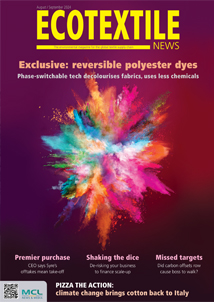Philip Berman sits down with Eva McGeorge, Lenzing’s Head of Marketing and Communications, to discuss the company’s recent survey on consumer attitudes to sustainability in fashion.
Lenzing says the aim of its new survey – the results of which will be revealed in the next issue – was to find out what drives and motivates consumers when it comes to shopping for textiles and clothing. Is it price? Sustainability? Or something else entirely?
Subscribe to our podcasts and radio shows by following us on Apple, Google, Spotify and Amazon Music, to automatically get alerts when we launch a new Ecotextile Talks Behind the News podcast.
The company told Ecotextile Talks, that it will also use the survey results of 7,000 shoppers in the United States, Spain, United Kingdom, and Germany, to help it to inform Lenzing’s ingredient brand Tencel how to tailor its support to the company’s brand and retail partners. The survey also aims to understand what is needed from a brand and consumer perspective and the role they can play to inform, educate, and provide clarity and guidance to consumers.
Speaking about consumer attitudes to sustainable purchasing revealed by the survey, McGeorge states, “If people want to do something different then they ultimately will do, but especially for textile and fashion there is this guilt gap. They (survey respondents) want to be sustainable but then different things get in the way like price, or the look, or the feel, or the style, and so on”.
A cross-section of countries was chosen for the survey – with some more developed in terms of sustainability attitudes in general – and the findings suggest that UK and US consumers are more likely to buy more clothes more regularly, in comparison to shoppers in Germany and Spain, where people tend to keep clothes longer and don’t shop as often.
The findings also identify four key points that can affect a consumer’s motivation to act in a sustainable way, leading to the suggestion of “creating an impact closer to home".
“As a consumer, I can very easily create an impact closer to home,” McGeorge says. “For example, recycling, reducing waste, and minimising packaging. However, sustainability in textiles and apparel is really a jungle when it comes to consumer perception. Where do you get your information and the right information, what is the ultimate truth?”
One key point from the survey was that: "consumers are really looking forward and very much relying on brands and retailers for guidance".
Consumers expect brands and retailers to be very clear on their websites, the labelling of product and in stores, and look to retailers for direction, guidance, and education on how to make an informed impactful choice.
“There are so many brands out there at all kinds of price levels, so the choice is there, the consumer to a certain extent is not yet aware – that’s why it needs this guidance and labelling, either from a regulatory perspective or a brand retail perspective, to be stronger and more forward educating consumers," McGeorge added.
Exclusive highlights of the survey will be revealed in the next issue of Ecotextile News.
To find out more survey information and key learnings, please visit the Tencel website to contact the team.












































